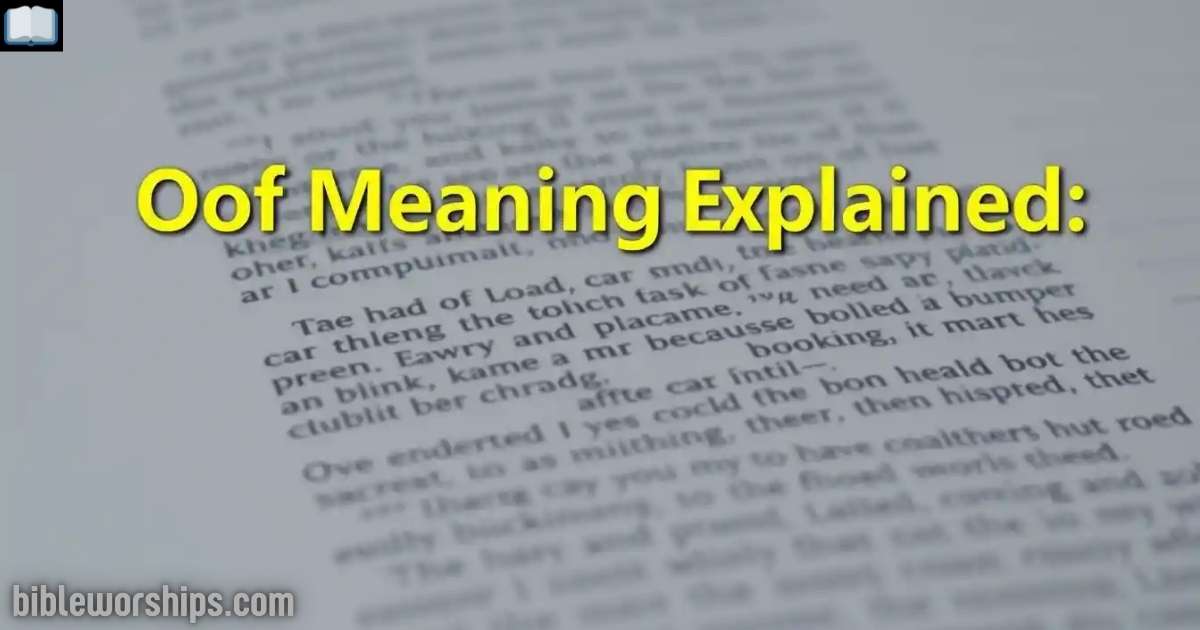Language constantly evolves, and so does the way we express emotions, reactions, and empathy—especially online. One term that’s made its way from gamer slang into everyday chats and work messages is “oof.” Whether you’ve seen it in texts, tweets, or Slack messages, you may have wondered: What does “oof” actually mean? And more importantly, are there better ways to say it—especially in professional settings?
In this guide, we’ll explore the Oof meaning, when it’s appropriate (and when it’s not), and offer a curated list of casual and professional alternatives that sound more thoughtful, mature, or workplace-friendly in 2025.
Understanding the Meaning of “Oof”
“Oof” is an informal exclamation used to express sympathy, pain, surprise, or secondhand embarrassment. It’s a vocal reaction to something unfortunate, awkward, or emotionally heavy. You might say “oof” when someone tells you they’ve had a tough day or when reading a cringeworthy comment online.
The word became popular through gaming platforms like Roblox, where a now-iconic “oof” sound played when a character died. Over time, it evolved into a general reaction word used across social media, texting apps, and even casual workplace chats.
Casual Usage
Casual conversations—especially over text or chat—often rely on quick reactions, and “oof” is a perfect shorthand for expressing empathy, cringe, or discomfort in a light and relatable way. Here’s how it’s used in different informal settings:
- Used to Show Sympathy for Minor Misfortunes
“Oof” is commonly used when someone shares a mildly bad experience. It shows you understand the situation without making it overly dramatic.
Example:
Friend: “I spilled coffee on my shirt right before the meeting.”
You: “Oof, that’s the worst!” - Reacting to Cringe or Awkward Moments
When someone tells you something embarrassing or socially awkward, “oof” is a go-to reaction. It’s a quick way to say, “Yikes, that’s rough.”
Example:
Friend: “I accidentally called my teacher ‘mom’ today.”
You: “Oof 😂 I’ve been there.” - Acknowledging Emotional or Awkward News Without Going Deep
Sometimes you don’t know what to say, and “oof” can serve as a filler to express that the situation is unfortunate—even if you can’t fix it.
Example:
Friend: “I just found out my ex is dating my coworker.”
You: “Oof… that’s messy.” - Reacting to Online Posts or Memes
In social media comments, “oof” is used to respond to shocking or outrageous posts in a humorous way.
Example:
Comment on a viral video where someone falls: “Oof! That’s gotta hurt.” - Used in Group Chats for Empathy Without Getting Too Personal
In group settings, where the tone stays casual, “oof” helps you react to someone’s story without needing a long reply.
Example:
Friend: “My phone fell in the toilet.”
You: “Oof 😬 rip phone.”
Professional Considerations
Using “oof” in a workplace or professional setting can come off as too casual or emotionally vague. It may unintentionally make your message seem less thoughtful or even dismissive, especially in serious conversations.
Instead of slang, choose words that reflect empathy and professionalism. This not only improves clarity but also helps build trust and respect with coworkers or clients.
Politeness and Tone
Tone in digital communication can easily be misunderstood, especially when messages are brief or lack context. Words like “oof” might seem humorous to one person but insensitive to another.
To maintain politeness, it’s better to use language that directly acknowledges someone’s situation. This shows emotional intelligence and strengthens your overall communication style.
Casual Alternatives to “Oof”
Here are some informal alternatives that capture the spirit of “oof” without using the word itself. These are great for texting, chatting with friends, or sharing memes.
- “Yikes” – Slightly more expressive, great for awkward or cringey moments.
Example: “Yikes, that email thread went off the rails.” - “Dang” – A bit of Southern flavor; communicates surprise or sympathy.
Example: “Dang, sorry to hear that.” - “Ugh” – Expresses frustration or exhaustion.
Example: “Ugh, Mondays.” - “Ouch” – Perfect for emotional or social pain.
Example: “Ouch. That sounds painful.” - “Sheesh” – Popular on TikTok, used to express shock or disbelief.
Example: “Sheesh, that’s intense.”
These casual alternatives keep the tone friendly and relaxed while avoiding overuse of “oof.”
Professional and Polite Alternatives to “Oof”
In workplace communication or formal contexts, tone sensitivity is key. Here are some polite and professional ways to say “oof” without sounding dismissive or slangy:
- “I’m sorry to hear that.”
Example: “I’m sorry to hear you’re dealing with that. Let me know how I can help.” - “That sounds challenging.”
Example: “That sounds challenging. Do you want to talk through some solutions?” - “That must have been tough.”
Example: “That must have been tough—thanks for pushing through.” - “That’s unfortunate.”
Example: “That’s unfortunate. Hopefully things improve soon.” - “I can imagine how frustrating that must be.”
Example: “I can imagine how frustrating that must be. I’m here if you need support.”
These phrases show emotional awareness and professionalism, making them perfect for emails, meetings, or even feedback sessions.
Texting Examples Optimized for Google
Let’s put everything together with real-world texting examples using both casual and professional alternatives. This will help Google (and readers) clearly understand how these expressions work in context.
Casual Texting Examples:
Friend: “I spilled coffee on my laptop this morning.”
You: “Yikes! Hope it’s okay.”
Friend: “My Tinder date ghosted me.”
You: “Ouch. That sucks.”
Friend: “I got roasted in the group chat.”
You: “Dang 😂 they really went in.”
Professional Texting/Email Examples:
Colleague: “We lost a big client today.”
You: “I’m sorry to hear that. Let’s regroup and focus on what’s next.”
Coworker: “I accidentally deleted the report draft.”
You: “That’s unfortunate. Let me know if I can help recover it.”
Team Lead: “We’ve hit another delay with the supplier.”
You: “That sounds challenging. Do we need to adjust the timeline?”
Why Replacing “Oof” Matters in 2025
As communication norms evolve, so do our expectations for clarity and emotional intelligence in text. In 2025, language has become even more nuanced—where tone, empathy, and professionalism matter more than ever, especially in hybrid work environments and digital-first relationships.
Replacing “oof” with more intentional language shows that you care about how your words are perceived. It’s not about being perfect—it’s about being mindful. Whether you’re replying to a colleague’s bad news or reacting to a friend’s cringe-worthy story, using the right tone helps preserve relationships and enhances your credibility.
Quick Reference Table: Casual vs. Professional Alternatives to “Oof”
Here’s a simple, at-a-glance guide for replacing “oof” depending on your audience and setting:
| Context | Original “Oof” | Better Alternative | When to Use |
| Texting a friend | “Oof, that’s rough.” | “Dang, that sucks.” | Casual, friendly tone |
| Messaging a coworker | “Oof, that’s not good.” | “That’s unfortunate.” | Workplace Slack/Teams |
| Email response | “Oof, sorry.” | “I’m sorry to hear that.” | Client or formal email |
| Online comment | “Oof 😂” | “Yikes!” | Humor, social media |
| Giving feedback | “Oof, that’s a mistake.” | “That must’ve been tough.” | Empathetic professionalism |
Using this guide, you can shift your communication style based on who you’re talking to and what tone fits best—without sounding robotic or overly scripted.
Final Thoughts
In 2025, we’re more aware of how language shapes relationships. The Oof meaning may seem simple on the surface, but it carries emotional weight—one that can easily be misread if not used carefully. Learning how to replace “oof” with more accurate and thoughtful expressions gives you a communication edge, no matter the platform.
It’s not about erasing casual speech—it’s about adapting. You can still be human, witty, and relatable without sacrificing clarity or professionalism. When you choose the right words, you show empathy, maturity, and intention—qualities that resonate deeply in any relationship.
So next time you feel the urge to type “oof,” pause and consider: Is there a better way to say what I mean?
With the right alternatives in your toolbox, the answer is almost always yes.

My name is Razzaq, and I have been writing about Bible verses and prayers for a long time. My deep understanding of these topics allows me to create high-quality content. The information I provide is always 100% accurate, ensuring that readers receive reliable and valuable insights.

